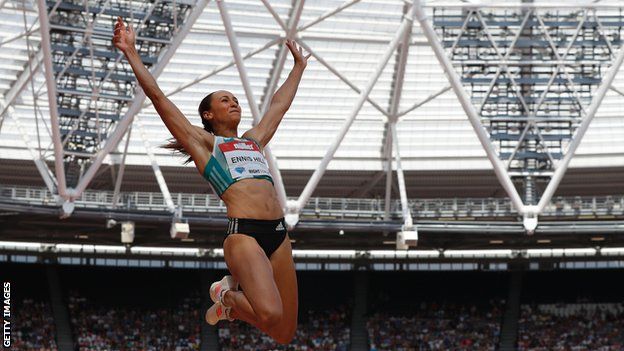Rio Olympics 2016: Athletes could face sanctions over controversial rule 40
- Published

Jessica Ennis-Hill is one of the 366 British athletes competing at the Rio Games next month
Having a sponsor tweet you good luck at the Olympics could get an athlete into trouble - and even cost them medals.
Words such as '2016', 'effort' and 'Olympian' - or even a picture of a medal - cannot be used by non-approved sponsors in any sort of advertising.
The punishment could mean athletes losing medals, although a reprimand would be the more likely outcome.
The Olympics' Rule 40 means athletes must cut ties with non-official partners until three days after Rio.
The bye-law states only approved sponsors may reference "Olympic-related terms" from 27 July until midnight on 24 August, so personal sponsors such as kit suppliers are not even allowed to re-tweet athletes.
While the bye-law, which is contained in the Olympic Charter, is not new, it has been picked up on since the International Olympic Committee chose not to impose a blanket ban on Russian competitors at the Rio Games.
The World Anti-Doping Agency had recommended the measure in the wake of a damning report into state-sponsored doping in Russia.
British former heptathlete Kelly Sotherton suggested the IOC was more interested in punishing athletes over sponsorship infringements than for doping.
"If your sponsor says good luck to you in Olympic time you face being booted out, but drugs cheats??! #rule40," she posted on Twitter., external
So what can't they say?
According to the IOC, "Olympic-related terms" include the following, depending upon context:
2016
Rio/Rio de Janeiro
Gold
Silver
Bronze
Medal
Effort
Performance
Challenge
Summer
Games
Sponsors
Victory
Olympian
While "Olympic listed terms or expressions" include:
Olympic
Olympics
Olympic Games
Olympiad
Olympiads
The Olympic motto "Citius - Altius - Fortius" (which is Latin for "Faster, Higher, Stronger) and any translation of it.
The regulations are not new, and were designed to counter so-called 'ambush marketing' from harming revenue that could be passed on to athletes and federations, while protecting the investment of official sponsors.
National Olympic committees are responsible for enforcing regulations, and Team GB published a guide detailing the restrictions, external in December.
Since London 2012 the rule has been relaxed slightly, and now athletes can appear in their sponsors' marketing during the Games if they are granted special dispensation.
British discus thrower Jade Lally posted this cryptic message on Twitter
- Published27 July 2016
- Published27 July 2016
- Published26 July 2016
- Published6 August 2016
- Published18 August 2016
- Published19 July 2016
- Published19 July 2016
- Published13 May 2016